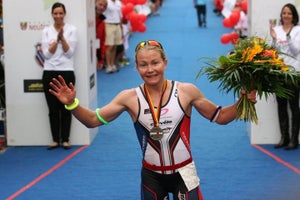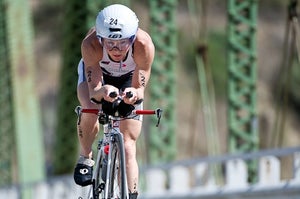Mary Beth Ellis Finds Her Racing Distance
American pro Mary Beth Ellis has had a busy summer. She finished in 8:43:34 on July 2 at Ironman Austria—her very first Ironman—and now only Chrissie Wellington and Rebekah Keat have ever raced faster than Ellis at the iron distance. She followed Austria with a runner-up finish at Alpe d’Huez and then a win at Ironman Regensburg earlier this month. A pro since 2006, she had a disappointing year in 2010, plagued by injury and sickness, but the Boulder-based pro may now have found her best racing distance. Ellis called us from TeamTBB camp in Switzerland via Skype to chat about her Ironman debut, joining TeamTBB and what’s next in her season.
Triathlete.com: So you’re in Switzerland now—how long have you been there?
Ellis: Since mid-June. A little over two months.
Triathlete.com: And then you just popped over to Austria and Germany to win Ironmans?

Ellis: Yeah. It’s been nice to drive to races over here instead of having to pack up the bike. I drove to both of those, which is nice.
Triathlete.com: How have you enjoyed living/training in Europe?
Ellis: It’s been interesting. I’ve never spent any extended time in Europe, so it’s been great. I mean, I ran in college, so I never had the whole semester abroad, so I’m getting to see the Alps and seeing some parts of Europe that I didn’t necessarily get to see. I think anytime you can change stuff up, it’s always good for you. At home, you always do the same training routes with the same crew, so it’s kinda nice sometimes to get out of the comfort zone.
Triathlete.com: What made you decide to go with TeamTbb?
Ellis: I spent most of 2010 either sick or injured and was just at a point where [I was debating between] moving on or giving it one more shot in triathlon. It was December, and I was thinking about what I wanted to do and had always in the back of my mind thought about that or talking to the team, just from the sense of wanting to give it one more good shot in the sport, and [then] I’d either succeed or move on. So yeah, I contacted them in December, and they gave me a shot. I went over to Thailand in February, which was a good learning experience and another place I haven’t spent much time, so that was great. And then, yeah, was in Thailand for a bit and then over here for the summer.
Triathlete.com: Why did you decide to do an Ironman for the first time this year?
Ellis: That actually was on my mind after all my—I was thinking Ironman was where I would be more successful, but I was still holding onto the Olympic aspiration. And after last year, I just decided I had done too many different distances—70.3, Olympic non-drafting and then ITU, and it’s hard to do the ITU type of races. Some people are successful doing other stuff with it, but for me, after last year, I didn’t do anything well, so I was like, ‘I need to focus on where I think I’ll have a little more success, so I’ll try some Ironmans.’
Triathlete.com: How has Brett Sutton influenced the way you train or race?
Ellis: I don’t think it’s really that different. Perhaps the difference is having a coach that you see a lot more, especially in a camp situation. You see your teammates and the coach every day, if not multiple times a day, which I think is invaluable. But as far as the actual training, I mean, I don’t think it’s any secret—everybody in the sport works hard. I tend to want to train until my leg falls off, and he’s been good about holding me back at certain times and pushing me at other times. It’s been good having that eye on you to just tell you when to back off and when to keep going.
Triathlete.com: How are you feeling now after a year of injuries?
Ellis: I’ve had a little bit of issues, but nothing too big this year. It’s been, relative to the last few years, relatively injury free. I think everybody has a niggle here or there, or stuff that comes and goes throughout the season. It’s part of the nature of being an athlete—there’s always something you have to deal with, but yeah relatively injury free.
Triathlete.com: Obviously you had a great result earlier this year at Ironman Austria—how did it feel to join the sub-9:00 club on your first attempt?
Ellis: It was amazing. I was hoping, I thought if I had a great day I could be around nine hours, so to see that time on the clock when I finished, I was really surprised. …
It was one of those races where things pretty much, you know if you could have scripted it, it went, excluding the last 10K of the run—which, I guess your first Ironman it should hurt pretty badly—but excluding that, it pretty much went better than I could have expected.
Triathlete.com: About a month later you competed in yet another Ironman. How did you manage to recover and prepare for the second one?
Ellis: Well I actually felt OK about a week or so after the first one. It’s hard, but I think a hard 70.3 tires me almost as much as the Ironman. I guess it’s a different kind of sore tired after an Ironman. But I felt pretty good. Actually I did a race in between—the Alpe d’Huez Triathlon. It was fun; we kind of made it into more of an adventure. We rode our bikes over there from Switzerland, so it was about 200 miles there over two days, and then we did the race and then rode our bikes home. That definitely made me mentally and physically strong. So when I went to Germany, I actually had some issues during that race, but I think I was able to get through it. I thought for a while I was going to have to drop out of the race, but I ended up getting through it. I think part of it having that trip to the Alpe race and getting through that race being tired, I soldiered on and really didn’t think I’d even finish in Regensburg but managed to still get the win, but I was just happy I didn’t give up at any point.
Triathlete.com: You’ve come so close to winning the 70.3 World Championship—twice [2008 and 2009]. Any plans to race that again?

Ellis: I was hoping to, but I don’t have enough points to get into Kona … so I’m going to have to race Ironman Canada next weekend. If I want to go to Kona, I basically have to race there. The original plan was to try to go to 70.3 worlds, but at this point if I pull up from Canada and feel OK, I’ll probably attempt it, but I’ll just play it by ear.
Triathlete.com: So you have Canada, then you have Kona maybe, and then a wedding in December—how’s the wedding planning going?
Ellis: Um, pretty good. Before I left, in February, March and April, I tried to nail down as much of the stuff that needed to be scheduled ahead of time, so we got the venue, the flowers and the dress—all the big vendors nailed down. I’m sure when we get to October, November, there will be a million little things that I’ll be trying to scramble and get done, but most of the big decisions are pretty much nailed down.
Triathlete.com: So how are you feeling about maybe racing Kona?
Ellis: It’s hard because I haven’t really made it there. But as soon as I get there, yeah, I’m excited. I mean, I would just love the opportunity to get there and race and see how it goes because I think Ironman is probably my best distance. And Hawaii’s always hard—there’s always great competition, so if I can get there, I’d love to get there and race.
Triathlete.com: How do you feel about the pro ranking system this year?
Ellis: I think overall it’s a step in the right direction. I think there’s just a few issues. One of my concerns is just—on the women’s side, having only 30 women versus 50 men, but then having the point system be the same. So basically having 30 women versus 50 men, they’re saying that our depth of field is only 60 percent of what the men is, but then the points don’t drop off accordingly. … They’ve already made this judgment, right or wrong, that the fields are that much weaker, so I think the point system should reflect some of that. And then the only other concern I have is the way they’re devaluing some of the longtime races, like the New Zealands and the Lanzarotes. And they’ve made it where somebody like Cam Brown has now had to scramble a little bit to make sure he would get in, just because he wanted to keep doing the race that he’s always winning. But overall, I do think it’s definitely a step in the right direction, and I think they’re doing a lot of things right. It’s exciting from a pro’s perspective just to see them taking some initiative and trying to make the system even better.